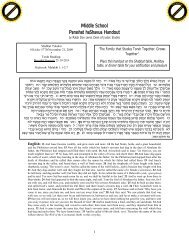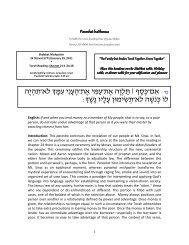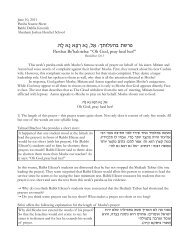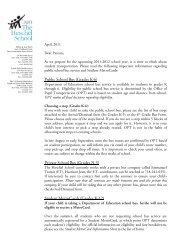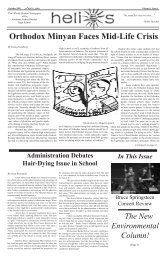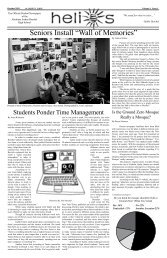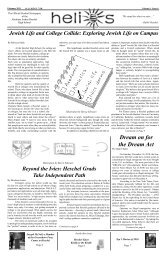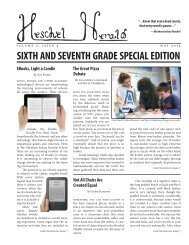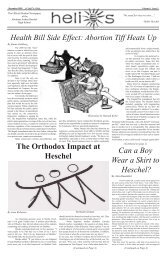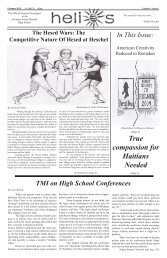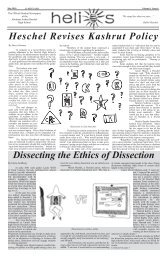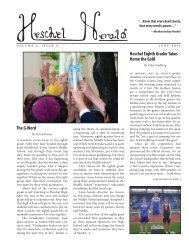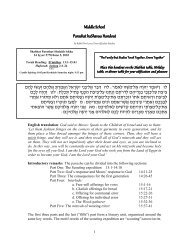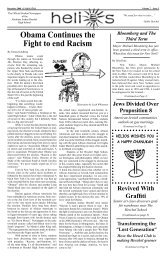Volume 9, Issue 3, January 2011 - The Heschel School
Volume 9, Issue 3, January 2011 - The Heschel School
Volume 9, Issue 3, January 2011 - The Heschel School
You also want an ePaper? Increase the reach of your titles
YUMPU automatically turns print PDFs into web optimized ePapers that Google loves.
שבט ה“תשע‘ א<br />
<strong>January</strong> October 2010 <strong>2011</strong><br />
Helios <strong>Volume</strong> 9 <strong>Issue</strong> 1 <strong>Volume</strong> 9 <strong>Issue</strong> Page 31<br />
<strong>The</strong> Official Student Newspaper<br />
of the<br />
Abraham Joshua <strong>Heschel</strong><br />
High <strong>School</strong><br />
“We stand for what we utter…”<br />
- Rabbi <strong>Heschel</strong><br />
<strong>Heschel</strong> Breaks Ground for One Campus Plan How Much Does <strong>Heschel</strong><br />
Know About <strong>Heschel</strong>?<br />
By Becca Schwarz<br />
Head of <strong>School</strong> Roanna Shorofsky speaks at the groundbreaking ceremony for the new <strong>Heschel</strong> building.<br />
Photograph By Lizzi Rauner<br />
By Zachary Stecker<br />
“Thank you for coming to celebrate a big hole<br />
in the ground,” said Jonathan Kern, a member of <strong>Heschel</strong>’s<br />
executive committee, referring to the empty dirt<br />
lot adjacent to the high school. Kern, who addressed the<br />
attendees of the school’s groundbreaking ceremony on<br />
December 5, was not speaking of any ordinary hole in<br />
the ground – he was speaking of the land that will soon<br />
be transformed into <strong>Heschel</strong>’s lower and middle school<br />
campus.<br />
<strong>The</strong> new building, which will complete the<br />
school’s “One Campus Plan,” will allow <strong>Heschel</strong> to welcome<br />
more than 225 new students, as well as their families,<br />
into its growing community. Reaching this point, of<br />
course, was no easy feat for <strong>Heschel</strong>. “Many meetings,<br />
drawings, and spreadsheets later,” quipped board member<br />
Alisa Doctoroff, “the One Campus Plan was born.”<br />
<strong>The</strong> groundbreaking event itself, which marked<br />
the commencement of construction on the new building,<br />
was built around the Talmud’s theme of “Ma’alin<br />
Banned Textbook Finds Home at <strong>Heschel</strong> High <strong>School</strong><br />
By Emma Goldberg<br />
In October, both the Israeli Education Ministry<br />
and the Palestinian Education Ministry banned<br />
classroom usage of the textbook, Learning Each Other’s<br />
Historical Narrative: Palestinians and Israelis.<br />
Gershon Baskin, founder and co-director of the only<br />
joint Israeli-Palestinian think tank, the Israel/Palestine<br />
Center for Research and Information claimed<br />
that the textbook was too controversial to ever be put<br />
into classroom use.<br />
<strong>Heschel</strong>’s senior dual narratives class is proving<br />
Baskin wrong.<br />
Israel’s Education Ministry explained that<br />
the book was banned because it “is based on the dangerous<br />
post-modernist premise employed by ‘new<br />
historians’ and post-Zionists that there are no such<br />
things as objective historical truths.”<br />
Israeli history classrooms often present the<br />
1948 War of Independence, in which the Jews triumphed<br />
against great odds, as, according to New<br />
B’kodesh,” taken from Talmud Bavli Shabbat 21B<br />
and translated as “We always ascend in holiness.”<br />
Ariela Dubler, co-chair of the groundbreaking ceremony,<br />
explained that this ties into Hanukah’s theme<br />
of expansion as told by the sage Hillel, who taught<br />
that one should add a candle each night as a symbol<br />
of growing in holiness rather than descending.<br />
Similarly, explained Dubler, the construction of a<br />
new learning institution symbolizes the miracle of<br />
expansion.<br />
In keeping with the theme of ascending<br />
in holiness, the eighth graders, fifth graders, and<br />
<strong>Heschel</strong> Harmonizers each performed a song. <strong>The</strong><br />
songs shared the general theme of “Hallelu” – praising<br />
God through song and music.<br />
Kern, who gave an update regarding the<br />
building plan, said the school’s plans for expansion<br />
will include a gym that can be converted into a theater,<br />
a regulation gym (this received particularly<br />
Continued on Page 4<br />
York Times reporter Ethan Bronner, “a near<br />
miracle of David-and-Goliath proportions.” <strong>The</strong><br />
Palestinian narrative presented in Learning Each<br />
Other’s Historical Narrative suggests that the<br />
Jews had a military advantage during the war,<br />
and exploited Palestinians who were thinking of<br />
leaving behind their land. <strong>The</strong> Ministry is not<br />
happy that the traditional Israeli historical narrative<br />
is being challenged.<br />
Sarah Fendrick, who instructs the senior<br />
history elective discussing both the Israel<br />
and Palestinian perspectives on the Arab-Israeli<br />
conflict, said that in order to foster dialogue between<br />
Israelis and Palestinians, the traditional<br />
historical narrative of Israel must be analyzed.<br />
“Palestinians and Israelis are both the subjects<br />
and the objects of the history of the conflict, and<br />
their personal biases will definitely influence<br />
the narratives of their history.”<br />
Continued on Page 3<br />
Inside This <strong>Issue</strong><br />
<strong>The</strong> answer? Not very much.<br />
As <strong>Heschel</strong> at <strong>Heschel</strong> week approached, the entire<br />
school began to prepare for a week of reflecting upon<br />
Rabbi <strong>Heschel</strong>, his values, and his teachings. Assemblies<br />
were planned, and the senior class, armed<br />
with weeks of studying <strong>Heschel</strong>’s writings, prepared<br />
a range of programming to bring Rabbi <strong>Heschel</strong> into<br />
focus for the entire student body.<br />
While Rabbi <strong>Heschel</strong> was being commemorated,<br />
however, questions arose regarding the general<br />
student body’s knowledge of his life and his teachings.<br />
A survey of students across the grades yielded<br />
a wide range of results. Very few students had indepth<br />
knowledge about Rabbi <strong>Heschel</strong>. One of those<br />
students, freshman Yuval Pearl, said, “<strong>Heschel</strong> was<br />
born in Warsaw and was one of the leading philosophers<br />
of the 20th century… <strong>Heschel</strong> believed that<br />
racism is man’s greatest threat and for that reason he<br />
marched with Martin Luther King Jr. against racism,”<br />
“Rabbi <strong>Heschel</strong> was a revolutionary thinker,<br />
with an amazing mind. His thoughts on pluralism<br />
within the Jewish community changed the world we<br />
live in in terms of interdenominational tolerance,”<br />
offered Asher Elbaz, a sophomore. Asked where he<br />
learned this information, he responded, “Most of<br />
my knowledge on <strong>Heschel</strong> came from that time his<br />
daughter came to the school to talk about him, his<br />
views, and his accomplishments.” He continued, “I<br />
really still don’t know as much about him as I think I<br />
should.”<br />
<strong>The</strong> majority of respondents knew very little<br />
specific information beyond his involvement in the<br />
civil rights movement and his belief in religious pluralism.<br />
Junior Isabel Merrin said, “Throughout lower<br />
school, middle, and high school… we have learned<br />
that he was a big civil rights activist and marched with<br />
Martin Luther King.”<br />
Those who knew little were not necessarily<br />
eager to learn more. One junior went so far as to say,<br />
“I don’t know anything about Rabbi <strong>Heschel</strong>. I have<br />
never read his books and I don’t think I ever will.”<br />
But is it possible that the students have more<br />
of an understanding of Rabbi <strong>Heschel</strong>’s values than<br />
they are aware of? Rabbi Natan Kapustin said that<br />
students in ninth through eleventh grades actually do<br />
have exposure to <strong>Heschel</strong>’s teachings. “In some parts,<br />
the LQ curriculum is heavily focused on <strong>Heschel</strong>’s<br />
writing. This is called the <strong>Heschel</strong>ian Overlay.”<br />
This curriculum is built on <strong>Heschel</strong>’s book, “Heavenly<br />
Torah,” which is an analysis of rabbinic literature.<br />
Many students may know this better by its subjects:<br />
Rabi Akiva and Rabi Yishmael, and their two schools<br />
of thought regarding immanence and transcendence.<br />
As Rabbi Natan noted, students are not really<br />
aware that this curriculum is based on one of Rabbi<br />
<strong>Heschel</strong>’s writings until they are in twelfth grade.<br />
Senior year is also when students begin to read and<br />
analyze <strong>Heschel</strong>’s work. This happens during senior<br />
seminar, a weekly class dedicated specifically to Rabbi<br />
<strong>Heschel</strong>’s writings.<br />
Asked why students do not start studying <strong>Heschel</strong>’s<br />
texts earlier than twelfth grade, Rabbi Natan<br />
responded that this issue was “something that the LQ<br />
department asked itself five years ago.” <strong>The</strong> answer<br />
was, as many seniors will confirm, that <strong>Heschel</strong>’s<br />
writings are incredibly challenging, and not necessarily<br />
appropriate for younger students. “We started with<br />
seniors because they are the best suited for this [type<br />
Continued on Page 4<br />
Chronicles of the<br />
New Jersey Bus<br />
<strong>The</strong> Buzz About<br />
Caffeine Fiends<br />
<strong>Heschel</strong><br />
At<br />
<strong>Heschel</strong><br />
Week
Page 2 Helios <strong>Volume</strong> 9 <strong>Issue</strong> 3 <strong>January</strong> <strong>2011</strong><br />
By Gabriel Fisher<br />
One Student’s Opinion: Students Benefit from<br />
New Approach to In-Class Essays<br />
In my first English class in<br />
10th grade, the teacher told the class<br />
that we would be writing only in-class<br />
essays that year. <strong>The</strong>re would be no essays<br />
to work on at home; instead, we<br />
were going to write every analytical<br />
piece in a 40 to 50 minute period, without<br />
notes or other documents. By 11th<br />
grade, I was expected to formulate my<br />
own thesis in that one period as well as<br />
write a complete five-paragraph essay.<br />
My first reaction was to ask<br />
why this policy was instated. My second<br />
reaction was to ask myself how I<br />
could ever complete this seemingly<br />
impossible task.<br />
A few years ago, the English<br />
department decided to give no takehome<br />
essays; rather, every few weeks<br />
students would write an essay in class.<br />
<strong>The</strong> department felt that too many essays<br />
were being written or significantly<br />
edited by either parents or tutors.<br />
This concern is serious. It is<br />
important that students write and edit<br />
their own essays. It is also important<br />
that teachers see their students’ raw<br />
abilities and analyze their skills without<br />
worrying whether the work was altered<br />
or improved by another person.<br />
<strong>The</strong> English department also<br />
believes that in-class essays teach students<br />
how to write clearly and concisely.<br />
Audrey Sieger, head of the English<br />
department, said in an email, “Writing<br />
an essay in class encourages students<br />
to organize, structure, and present their<br />
ideas in writing within a specific time<br />
frame, which is a necessary skill…<strong>The</strong><br />
“We say words but make no decisions,<br />
forgetting that in prayer words are<br />
commitments, not the subject matter<br />
for aesthetic reflection, and that prayer<br />
is meaningless unless we stand for<br />
what we utter, unless we feel what we<br />
accept.”<br />
Rabbi Abraham Joshua <strong>Heschel</strong><br />
wrote this passage as part of an<br />
essay featured in his book Moral Grandeur<br />
and Spiritual Audacity, compiled<br />
and edited by his daughter Susannah<br />
<strong>Heschel</strong> in 1997. Eight years later,<br />
Helios adopted an excerpt – “We stand<br />
for what we utter” – as its motto.<br />
It would be easy to accept our<br />
motto for what it is, to notice it and<br />
neglect it or even to disregard it all together;<br />
but doing so would be irresponsible.<br />
As the school’s leading source of<br />
Helios is a newspaper published<br />
approximately seven times a<br />
year by the student staff of the Abraham<br />
Joshua <strong>Heschel</strong> High <strong>School</strong>, 20<br />
West End Avenue, NY, NY 10023.<br />
Telephone: 212-246-7717. E-mail: helios@heschel.org.<br />
Helios is distributed free to all<br />
members of the student body. <strong>The</strong> publication<br />
is a member of the Columbia<br />
Scholastic Press Association.<br />
Commentaries and opinion<br />
columns are the expressed opinion of<br />
the author and not of Helios and its<br />
editorial board or its advisors. Furthermore,<br />
the opinions are not those of the<br />
Abraham Joshua <strong>Heschel</strong> <strong>School</strong> faculty<br />
or administration.<br />
goal is to write concisely.”<br />
It is also important to note<br />
that for myself and other students, the<br />
task of writing an in-class essay is not<br />
nearly as daunting as it first seemed.<br />
My worst fear – not being unable to<br />
complete the essay in time - has never<br />
happened.<br />
Still, I question whether the<br />
in-class essay is the most effective system<br />
to gauge students’ abilities, a doubt<br />
that has also been expressed by many<br />
“To put it simply, it’s<br />
pretty hard to write a<br />
complex and insightful<br />
essay on a novel when<br />
given only one class<br />
period in which to<br />
complete it.”<br />
of my peers. Juniors David Benhuri<br />
and Max Lippman both commented on<br />
the difficulty of writing in-class essays.<br />
Lippman said, “You don’t really have<br />
45 minutes to write the essay since<br />
it takes some time to formulate your<br />
ideas before you can even start.” Benhuri<br />
added, “You simply don’t have<br />
enough time.”<br />
Under this time pressure, I<br />
have often found that my ideas are neither<br />
completely clear nor fully developed.<br />
I have also noticed that my writing<br />
is never crisp or succinct. While I<br />
have been able to submit something<br />
when the bell rings, I have always felt<br />
that it was far from my best work. To<br />
Editorial<br />
news and opinion, we must strive to<br />
make relevant the words of our namesake.<br />
We must write, in the words of<br />
<strong>Heschel</strong>, as though “each word has a<br />
soul.”<br />
Of course, this applies not only<br />
to Helios but also to the entire school<br />
community at large. We must strive<br />
to welcome Rabbi <strong>Heschel</strong>’s philosophies<br />
into our lives, not only because<br />
he is our school’s namesake, but also<br />
because doing so will repair the way in<br />
which each of us uses words and help<br />
us to understand the power of words, in<br />
prayer and in daily conversation.<br />
It is not enough to read <strong>Heschel</strong>’s<br />
teachings for one week each<br />
Helios Information and Policies<br />
Letters to the Editor must include<br />
the writer’s name and class. Helios<br />
will not print anything deemed<br />
libelous, obscene, or in poor taste, in<br />
accordance with the Supreme Court’s<br />
justified standards. Rights are reserved<br />
to postpone, edit, or withhold from<br />
publication anything submitted which<br />
does not meet the specifications. <strong>The</strong><br />
meaning of any submission will be not<br />
altered, but we reserve the right to correct<br />
spelling, grammar, and punctuation<br />
when necessary. Additionally, Helios<br />
refuses to print criticism that is not<br />
constructive and supported by facts.<br />
Helios will not intentionally<br />
invade the privacy of any person and<br />
will make every effort to correctly<br />
put it simply, it’s pretty hard to write a<br />
complex and insightful essay on a novel<br />
when given only one class period in<br />
which to complete it.<br />
Recently, my English class<br />
wrote an in-class essay in two periods.<br />
On the first day we wrote our<br />
thesis statements and formulated our<br />
ideas for each paragraph, and during<br />
the following class we wrote the essay.<br />
Sieger explained that she thought<br />
of the new method after noticing that<br />
many students struggled to formulate a<br />
compelling, complex thesis in the one<br />
period allotted to them. She said that,<br />
“By providing the topics for the essay<br />
in advance, everyone could experiment<br />
with various thesis ideas and meet with<br />
me to discuss the strength of their arguments.”<br />
Many students in the class<br />
found this to be a far superior system<br />
that led to more insightful and wellformed<br />
essays while also decreasing the<br />
usual stress as a result of time pressure.<br />
<strong>The</strong>y also felt that having the extra time<br />
allowed them to think through their<br />
ideas and focus more on their writing<br />
style. <strong>The</strong> process, many claimed, was<br />
not only less pressured, but also a better<br />
learning experience.<br />
Ethan Finkelstein, a student in<br />
Sieger’s 11th grade class, believed that<br />
the new in-class essay format allowed<br />
him to write a better essay. “My grade<br />
dramatically increased and I found it to<br />
be much more helpful in understanding<br />
how to write an essay.”<br />
It seems that being able to let<br />
students prepare for an in-class essay at<br />
home may be just the right solution.<br />
year, to hear his quotations over the<br />
loudspeaker without contemplating<br />
their meanings or the impact that they<br />
can have on our lives and our relationships.<br />
Each student and faculty member<br />
must take it upon himself or herself to<br />
fully absorb Rabbi <strong>Heschel</strong>’s philosophies<br />
and then allow them to infiltrate<br />
everyday life. It is, however, not something<br />
that can simply happen; rather, it<br />
is something that requires a bit of effort.<br />
If every person, following in<br />
the historic footsteps of Rabbi <strong>Heschel</strong>,<br />
were to treat each word as a though it<br />
has a soul, as though each word is a<br />
commitment in itself, we might succeed<br />
in paying closer attention to the words<br />
we choose when addressing God and<br />
our peers, as well the manner in which<br />
we deliver them.<br />
spell names and make accurate class<br />
and position identifications. Accurate<br />
reporting of fact is the goal of the staff.<br />
Opinions will be clearly<br />
marked and found on the editorial<br />
pages or as designated on other pages.<br />
Corrections will be printed when mistakes<br />
are found or brought to the attention<br />
of the staff. Original stories will<br />
carry bylines, although stories rewritten<br />
by someone other than the original<br />
author will not receive a byline.<br />
Members of the staff are guided<br />
by the Code of Ethics of the Society<br />
of Professional Journalists, which outlines<br />
principles of responsibility, fairness,<br />
and accuracy.<br />
Helios Staff<br />
2010-<strong>2011</strong><br />
Editors-in-Chief:<br />
Gabriel Fisher<br />
Emma Goldberg<br />
Art and Layout Editors:<br />
Gabrielle Belok<br />
Talia Niederman<br />
News Editors:<br />
Rebecca Schwarz<br />
Zachary Stecker<br />
Sports Editor:<br />
Gabriel Klausner<br />
Culture Editors:<br />
Anna Rothstein<br />
Shoshana Lauter<br />
Contributing Writers:<br />
Hana Joy Ain<br />
Elliot Allen<br />
Adam Chanes<br />
Rebecca Cooper<br />
Elizabeth Rauner<br />
Gabrielle Sherman<br />
Contributing Artists:<br />
Sasha Gayle-Schneider<br />
Cara Leiderman<br />
Rebecca Leeman<br />
Julie Maschler<br />
Shipley Mason<br />
Elizabeth Rauner<br />
Anna Rothstein<br />
Rebecca Schwarz<br />
Shayna Hertz<br />
Faculty and Staff:<br />
Lisa Cohen<br />
Gabe Godin<br />
Audrey Sieger<br />
Dena Schutzer<br />
We would like to formally thank<br />
Samuel Freedman. His dedication<br />
has helped us move Helios to<br />
the next level.<br />
Printing courtesy of Tri-Star<br />
Offset & Barry Goodman<br />
20 West End Avenue<br />
New York, New York 10023<br />
Send your<br />
comments to<br />
helios@heschel.<br />
org on<br />
First Class.
<strong>January</strong> <strong>2011</strong> Helios <strong>Volume</strong> 9 <strong>Issue</strong> 3 Page 3<br />
Banned Textbook Finds Home at <strong>Heschel</strong> High <strong>School</strong><br />
Continued From First Page<br />
Fendrick added that the course helps<br />
students to develop their critical<br />
thinking and analytical skills. “<strong>The</strong><br />
prism you are looking through will<br />
change your view<br />
on any historical<br />
narrative. We do<br />
not study history to<br />
merely learn facts.<br />
Rather, we are<br />
learning to become<br />
critical, analytical<br />
thinkers.”<br />
Junior Sharona<br />
Nahshon,<br />
who spends much<br />
of her time in Israel<br />
with family,<br />
takes a more skeptical<br />
view of the<br />
textbook’s exploration<br />
of history’s<br />
subjectivity. “It is<br />
often difficult to<br />
draw the line between<br />
perspective<br />
and fabrication,”<br />
Nachshon said.<br />
“And that is an<br />
important line to<br />
draw.”<br />
H e s c h e l<br />
High <strong>School</strong> history<br />
teacher Joe<br />
Moreau authored<br />
a 2003 book called<br />
<strong>School</strong>book Nation:<br />
Conflicts<br />
over American<br />
History Textbooks<br />
from the Civil War<br />
to the Present that<br />
explores the subjective nature of<br />
history. Though he understands the<br />
thinking that went into the stance<br />
of the Israeli Ministry of Education,<br />
Moreau fervently disagrees<br />
with it. He explained that the Ministry<br />
was trying to conjure an image<br />
of the textbook as supporting<br />
extreme relativists who use the idea<br />
of subjective history to present dual<br />
narratives on subjects such as the<br />
Holocaust—something that Moreau<br />
sees as “offensive and unacceptable.”<br />
However, Moreau said,<br />
“That is not what the dual narratives<br />
textbook debate is about. <strong>The</strong><br />
textbook does not represent extremist<br />
relativism. It is about the story<br />
of the formation of the State of Israel,<br />
which really is informed by so<br />
many different perspectives.”<br />
Many see the textbook as<br />
helpful for the facilitation of a peace<br />
process in the Middle East because<br />
it presents opposing viewpoints and<br />
thereby has the potential to foster<br />
productive dialogue between Israelis<br />
and Palestinians.<br />
Fendrick explained that the<br />
textbook is not only a source of information<br />
on the conflict, but also<br />
a model of a grassroots initiative<br />
addressing tension in the Middle<br />
Illustration By Rebecca Schwarz<br />
East. Fendrick said, “We look at the<br />
course from a meta-perspective. We<br />
question the course itself, asking if<br />
the textbook does a good job at enabling<br />
us to hear both sides of the<br />
issue or if the two sides presented<br />
are just irreconcilable.” Fendrick’s<br />
course culminates with students developing<br />
their own grassroots peace<br />
initiatives addressing the Israeli-<br />
Palestinian conflict and presenting<br />
them to the class.<br />
Bradley Burston, senior<br />
editor of Haaretz online, emphasized<br />
the importance of including<br />
American teenagers in the Israeli-<br />
Palestinian peace process dialogue.<br />
Burston, who made aliyah to Israel<br />
“Palestinians and Israelis<br />
are both the subjects and<br />
the objects of the history of<br />
the conflict, and their personal<br />
biases will definitely<br />
influence the narratives of<br />
their history.”<br />
30 years ago, explained, “Right<br />
now there are a lot of Jews—both<br />
in America and Israel—who don’t<br />
want to discuss politics at all. <strong>The</strong>y<br />
only want to hear that Israel is<br />
right and Palestine is wrong. <strong>The</strong><br />
battle over this textbook is really a<br />
struggle over a larger issue. This is<br />
a struggle to bring these Jews into<br />
the dialogue, to teach the narrative<br />
of the conflict in a balanced but accessible<br />
way. And it’s great to in-<br />
volve American Jewish teenagers<br />
in that struggle as well.”<br />
Fendrick said that the goal<br />
of the course is also to teach students<br />
conflict resolution skills,<br />
which are applicable even in the<br />
everyday lives of students.<br />
Aside from providing<br />
information on<br />
Middle East tension,<br />
the textbook conveys<br />
the importance of understanding<br />
alternative<br />
perspectives.<br />
Junior Sasha Gayle<br />
Schneider spent this<br />
summer in Israel with<br />
a program bringing together<br />
Americans and<br />
Israelis from a variety<br />
of backgrounds, and<br />
she believes that it is<br />
vital for high school<br />
students to learn the<br />
power of understanding<br />
others’ points of<br />
view. “<strong>The</strong> perspectives<br />
on the Israeli-<br />
Palestinian conflict<br />
offered in mainstream<br />
United States media<br />
often generalize and<br />
portray the conflict as<br />
Jew versus Arab, Israeli<br />
versus Palestinian.<br />
If we, as Jewish<br />
students, could learn<br />
more about the Palestinian<br />
perspective, we<br />
could begin to have<br />
a more informed dialogue.”<br />
Though many praise<br />
the textbook as a valuable educational<br />
tool that balances Israel’s<br />
historical narrative, even proponents<br />
of the textbook raise critiques.<br />
Burston warned that using<br />
the textbook runs the risk of pitting<br />
classmates against one another, as<br />
Middle East tension touches on<br />
many issues, both personal and political.<br />
Fendrick emphasized that<br />
the <strong>Heschel</strong> course focuses more<br />
on humanitarian issues than on political<br />
issues.<br />
Fendrick finds it fitting that<br />
<strong>Heschel</strong> High is working with this<br />
textbook, as its approach is aligned<br />
with so many of the <strong>Heschel</strong><br />
school’s core values. “This textbook<br />
is all about understanding the<br />
perspective of the other—whether<br />
you are Israeli or Palestinian,”<br />
Fendrick said. “<strong>The</strong> heart of Abraham<br />
Joshua <strong>Heschel</strong>’s mission was<br />
to march in the other’s shoes, and<br />
to put your arm around the other<br />
and embrace their perspective,<br />
while still holding on to your own<br />
beliefs.”
Page 4 Helios <strong>Volume</strong> 9 <strong>Issue</strong> 3 <strong>January</strong> <strong>2011</strong><br />
<strong>Heschel</strong> Breaks Ground for One Campus Plan<br />
From left: Cookies from the reception. <strong>The</strong> <strong>Heschel</strong> Harmonizers performing during the ceremony. Photographs By Lizzi Rauner<br />
Continued from Page One<br />
loud applause, as the middle school<br />
currently has only half a gym), study<br />
rooms, a larger student life office,<br />
state-of-the-art science and computer<br />
labs, art studios, and a new cafeteria.<br />
“Parents will have to make lunch no<br />
more!” Kern said, receiving thunderous<br />
applause and cheering from the<br />
more than one hundred parents in attendance.<br />
Kern noted that a school is<br />
not just about the physical building.<br />
“What makes a school great is what<br />
By Zoe Goldberg<br />
Rabbi Abraham Joshua <strong>Heschel</strong><br />
is not only the namesake of our<br />
school, but a Jewish theologian who<br />
built a unique, original philosophy<br />
of Judaism and life in general. Rabbi<br />
<strong>Heschel</strong> was born in 1906 in Warsaw,<br />
Poland to Moshe Mordechai <strong>Heschel</strong>,<br />
who died young, and Reizel Perlow,<br />
<strong>Heschel</strong> attended traditional yeshiva<br />
in Warsaw and then attended the University<br />
of Berlin. He received ordination<br />
at the Higher Institute for Jewish<br />
Studies in Berlin, where he later taught<br />
Talmud.<br />
In October 1938, <strong>Heschel</strong> was<br />
living in Frankfurt, Germany when the<br />
Gestapo caught him and deported him<br />
to Poland, where he spent some time<br />
teaching at the Institute for Jewish<br />
Studies in Warsaw. A mere six weeks<br />
“High school<br />
students will be able<br />
to teach lower school<br />
and middle school<br />
students, and middle<br />
school students can<br />
teach lower school<br />
students.”<br />
Not Just a Namesake:<br />
<strong>The</strong> Life of Abraham Joshua <strong>Heschel</strong><br />
before the Nazis invaded Poland,<br />
he fled to London where he<br />
founded the Institute for Jewish<br />
Learning.<br />
After leaving London in<br />
1940, <strong>Heschel</strong> joined the faculty<br />
at the Reform Movement’s Hebrew<br />
Union College in Cincinnati.<br />
Soon afterwards, he became<br />
the professor of Jewish Ethics<br />
and Mysticism at the Conservative<br />
Movement’s Jewish <strong>The</strong>ological<br />
Seminary in New York<br />
City. He gained American citizenship<br />
in 1945 and then married<br />
Sylvia Straus, a concert pianist.<br />
Rabbi <strong>Heschel</strong> had one child,<br />
Susannah <strong>Heschel</strong>, who spoke<br />
about her father last year at the<br />
high school. <strong>Heschel</strong> stayed in<br />
New York City until his untimely<br />
death on December 23, 1972.<br />
<strong>Heschel</strong>’s primary goal in his<br />
work was to establish a modern philosophy<br />
of religion that he based on Jewish<br />
texts and traditions. He also believed<br />
strongly in social action and did much<br />
to try and improve his world. He was a<br />
dear friend of Dr. Martin Luther King Jr.<br />
and a strong advocate for civil rights and<br />
against the Vietnam War. <strong>The</strong> two leaders<br />
had much in common. Both referenced<br />
the Bible and the liberation of the Jews<br />
from Egypt in their speeches, believed<br />
in a God that was very present among<br />
the people, and advocated both for black<br />
civil rights and against the Vietnam War.<br />
Rabbi <strong>Heschel</strong> spoke at Dr. King’s funeral,<br />
while Dr. King once referred to <strong>Heschel</strong><br />
as “one of the great men of our age,<br />
a truly great prophet.”<br />
How Much Does <strong>Heschel</strong> Know<br />
About <strong>Heschel</strong>?<br />
Continued from First Page<br />
of study].”<br />
Some seniors expressed<br />
doubt about whether younger students<br />
should struggle with <strong>Heschel</strong>’s<br />
dense writings. One senior felt that<br />
analyzing <strong>Heschel</strong>’s work before<br />
twelfth grade would be “torture.” Andrew<br />
Berson said, “I am not sure I or<br />
the majority of my grade could have<br />
completely<br />
comprehended<br />
his ideas<br />
before senior<br />
year. I still<br />
don’t think I<br />
comprehend<br />
all of his<br />
ideas.”<br />
O n<br />
the other<br />
hand, senior<br />
David<br />
Mishaan said,<br />
“Why wait<br />
until our final<br />
year of<br />
high school to<br />
start this? I mean, it would be nice<br />
if it started in freshman year in small<br />
bits and built up to what it is now in<br />
twelfth grade. [That way, throughout]<br />
our whole experience at <strong>Heschel</strong><br />
we’d be immersed in <strong>Heschel</strong>, and by<br />
the end of our senior year, we’d have<br />
a real sense of accomplishment.”<br />
Along similar lines, Zoe<br />
Grossman, another senior, offered,<br />
“I think it’s really important to have<br />
all the grades learn about <strong>Heschel</strong>,<br />
mainly because it is very frustrating<br />
we teach each other, and how we<br />
interact with one another,” he said.<br />
Given the new building’s adjacency<br />
to the high school, Kern hopes<br />
that “high school students will be<br />
able to teach lower and middle<br />
school students, and middle school<br />
students can teach lower school<br />
students.”<br />
All those who spoke at the<br />
event on behalf of the building<br />
committee and the school’s executive<br />
committee expressed their belief<br />
that everyone will benefit from<br />
the school’s physical unity, having<br />
all students from kindergarten to<br />
twelfth grade on the same block.<br />
No feat as large and as expensive<br />
as this one could be carried out<br />
without proper fundraising and generous<br />
donations. Ronald P. Stanton,<br />
the project’s main donor, addressed<br />
the event’s attendees, receiving a<br />
standing ovation from the grateful<br />
crowd. Stanton shared his dream<br />
for Judaism’s growth and his belief<br />
that the new building will bring the<br />
school one step closer to reaching a<br />
much larger goal. <strong>The</strong> new campus is<br />
to be named in Stanton’s honor.<br />
to learn so much in so little time.”<br />
Senior Jacob Abudaram said, “I<br />
stand somewhere in the middle. While I<br />
do think we would get less out of <strong>Heschel</strong>’s<br />
writings if we were to study them<br />
as underclassmen, I still think it is important<br />
to understand his core values.<br />
Though he does write in a fairly esoteric<br />
way, students at the <strong>Heschel</strong> <strong>School</strong><br />
need to understand the principles upon<br />
which their school was built.”<br />
Regardless of<br />
whether or not<br />
students below<br />
twelfth grade<br />
should read and<br />
analyze his writings,<br />
this year’s<br />
<strong>Heschel</strong> at <strong>Heschel</strong><br />
week was<br />
a step toward<br />
h e i g h t e n i n g<br />
awareness of<br />
Rabbi <strong>Heschel</strong>’s<br />
values. According<br />
to Rabbi<br />
Illustration By Julie Maschler Natan, <strong>Heschel</strong><br />
at <strong>Heschel</strong> week<br />
has become a<br />
bigger deal than it was in previous<br />
years. If freshman, sophomore, and junior<br />
students now decide that they want<br />
to learn more about <strong>Heschel</strong>, then the<br />
curriculum could change.<br />
“When could have only hoped<br />
for a day where students said they wanted<br />
to learn more about <strong>Heschel</strong>,” said<br />
Rabbi Natan. “That’s a sign that our<br />
focus on putting <strong>Heschel</strong> into the upper<br />
grades is now seeping down and spreading<br />
into the other grades.”<br />
“And that’s a good sign.”
<strong>January</strong> <strong>2011</strong> Helios <strong>Volume</strong> 9 <strong>Issue</strong> 3 Page 5<br />
By Anna Rothstein<br />
In a recent New York Times<br />
article titled “Behavior: Too Much<br />
Texting Is Linked to Other Problems,”<br />
Roni Caryn Rabin wrote,<br />
“About 20 percent [of high school<br />
students] sent at least 120 text<br />
messages a day, 10 percent were<br />
on social networking sites for<br />
three hours or more, and 4 percent<br />
did both.”<br />
<strong>The</strong>se statistics may not be<br />
so shocking to <strong>Heschel</strong> students.<br />
Because <strong>Heschel</strong> is a “computer<br />
school” and all homework assignments<br />
are posted and submitted<br />
through FirstClass, students spend<br />
much of their time on computers.<br />
In addition, throughout the<br />
day they may use other electronic<br />
devices, such as cell phones, iPods,<br />
or even iPads. Socializing<br />
is a prominent part of a teenager’s<br />
high school experience and<br />
it is easy to text friends at other<br />
schools, in other states, or even in<br />
other countries.<br />
<strong>The</strong>re are definitely advantages<br />
and disadvantages to the<br />
teenage technology rage; however,<br />
problems arise when technology<br />
starts detracting from a student’s<br />
time for other activities, such as<br />
recreational reading. Most <strong>Heschel</strong><br />
students feel that they have<br />
no time to read for pleasure.<br />
Asked whether he has<br />
the time to read books outside<br />
of school, Junior Joaquin Acrich<br />
commented, “I did in middle<br />
school…[but stopped] once school<br />
started to deprive me of sleep.”<br />
Reading Time: a Scarce Commodity<br />
<strong>Heschel</strong> students have more difficulty<br />
finding time than students<br />
who attend public school because<br />
of <strong>Heschel</strong>’s later dismissal time.<br />
Because the school day ends so<br />
late and many students commute<br />
from outside of Manhattan, a student’s<br />
time to do work, let alone<br />
read for pleasure, is extremely<br />
limited.<br />
Renee Berger expressed<br />
feelings similar to Acrich’s regarding<br />
the issue. “I really don’t<br />
Illustration By Shipley Mason<br />
“Students should start<br />
spending less time on<br />
Facebook and more<br />
time facing books.”<br />
have time,” she said. “I read baby<br />
books [if I want to read for pleasure]<br />
because I don’t have time to<br />
do anything that has substance because<br />
of the vast amount of school<br />
work I must complete.”<br />
One student who wishes<br />
to remain anonymous said s/he<br />
doesn’t have time to read mandatory<br />
books for school, let alone<br />
to read for fun. If students are<br />
assigned new books to read for<br />
English or History class on top of<br />
the rest of their workload, arrive<br />
home after 5 p.m., and want to get<br />
to bed at a reasonable hour, they<br />
will rarely find the time to read<br />
for pleasure.<br />
Both during the school<br />
year and over the summer, students<br />
are assigned books to read<br />
for school, so how might a student<br />
have time to read for fun even in<br />
the summer?<br />
Senior Deborah Gross and<br />
Freshman Josh Rudin each make<br />
an effort to find time to read outside<br />
of school. Rudin said, “I read<br />
for fun [because] I like learning<br />
new things and reading exciting<br />
stories.”<br />
Gross added, “I’m a big<br />
reader because it’s an intellectually<br />
stimulating way to pass time.<br />
I find time to read because I make<br />
time to read. When I’m reading<br />
I don’t have to worry about anything<br />
else – it’s literally an escape.”<br />
Though a student’s workload<br />
is a significant factor in depriving<br />
students of sleep, Rabin<br />
points out in her article that students<br />
also need to learn to manage<br />
their time better. Her article seems<br />
to suggest that students should<br />
start spending less time on Facebook<br />
and more time facing books.<br />
New Jersey Bus Faces Bumps in the Road<br />
By Hana Joy Ain<br />
<strong>Heschel</strong> High <strong>School</strong> students<br />
who live in New Jersey<br />
face some challenges getting to<br />
school. Living in New Jersey<br />
means long journeys to get to<br />
and from school. Because many<br />
of the New Jersey students live<br />
near one another, Lindsey Rubin,<br />
High <strong>School</strong> transportation coordinator,<br />
was able to arrange for<br />
a bus, known as the Jersey bus,<br />
to transport the New Jersey students.<br />
Because of complaints<br />
concerning last year’s bus service,<br />
Rubin has arranged for a<br />
new bus service and a new route,<br />
which stops in front of each student’s<br />
house to pick him or her<br />
up in the morning. With all of the<br />
added bus stops, the route is longer<br />
and students have to wake up<br />
very early. Rubin explained that<br />
she has dealt with this issue by<br />
working with Assistant Head of<br />
the High <strong>School</strong>, Jessica Gribetz.<br />
“Since the kids were waking up<br />
so early, we confirmed with Jessica<br />
that it is fine if they arrive a<br />
little late to t’fillah.”<br />
Despite the bumpy road<br />
of the Jersey bus route at the<br />
beginning of this year, many<br />
students have good experiences<br />
with the Jersey bus.<br />
“It’s an accepted<br />
fact that in the<br />
morning<br />
everyone must<br />
be silent on the<br />
Jersey bus.”<br />
Junior Adam Cole said,<br />
“My experience on the New Jersey<br />
bus has been positive.” Cole<br />
said that he is able to sleep on<br />
the bus, so “I have a necessary<br />
extra 45 minutes of sleep every<br />
morning. I even bring a pillow<br />
with me to school every morning<br />
to make my morning slumber<br />
more comfortable. It’s an accepted<br />
fact that in the morning<br />
everyone must be silent on the<br />
Jersey bus.”<br />
<strong>The</strong>re are still a few obstacles<br />
that New Jersey students<br />
face, but Rubin is working to address<br />
them. Many students have<br />
complained because the school<br />
doesn’t provide a late bus to take<br />
home the students who stay after<br />
school for clubs.<br />
Cole commented, “I’m<br />
not sure there are enough kids<br />
who stay after school for it to<br />
be worth it.” Lindsey Rubin, in<br />
agreement with Cole, said, “I<br />
would be more than happy to<br />
have that, but it will cost more<br />
money to the school and to the<br />
students who want the bus.“<br />
Jersey students have also<br />
complained that the bus sometimes<br />
leaves after school before<br />
all students are on board. Rubin<br />
said that the bus policy promises<br />
that the drivers will wait ten minutes<br />
after school before leaving.<br />
Rubin said, “If they [students]<br />
are running late, they<br />
need to ask another student, or<br />
the bus driver to stay a few extra<br />
minutes... Communication is the<br />
key.”<br />
<strong>The</strong> last hitch in the Jersey<br />
bus ride is that the bus is not<br />
very comfortable. Cole reported<br />
that, “It throws students out of<br />
their seat when it goes over a<br />
pothole.”<br />
Rubin said that discomfort<br />
is often the fault of students<br />
who do not sit in their seats correctly.<br />
During school field trips<br />
she has witnessed students sitting<br />
on their knees facing the<br />
seat behind them in order to<br />
chat with their friends. “ If you<br />
are sitting in the seat in the correct<br />
way you will not fall, but if<br />
you are sitting on your knees or<br />
standing up, then you are going<br />
to fall over. Sit safely.”
Page 6 Helios <strong>Volume</strong> 9 <strong>Issue</strong> 3 <strong>January</strong> <strong>2011</strong><br />
Assessing Computer Use at <strong>Heschel</strong><br />
By Adam Chanes (with assistance<br />
from Jordan Katz)<br />
From its beginning, the <strong>Heschel</strong><br />
High <strong>School</strong> has required that<br />
each student have a laptop computer.<br />
This decision, part of the<br />
vision for the school, was based<br />
on the realization that computers<br />
are beneficial to learning in many<br />
ways. As Information Technology<br />
director John Hutzler said, “Computers<br />
are magnificent tools.” His<br />
comment referred to the use of<br />
FirstClass as an academic tool,<br />
with its interconnected student-teacher-class<br />
e-mail<br />
system, as well as to other<br />
applications that speed up<br />
the progress of the class.<br />
Among the students<br />
and faculty, however, are<br />
varying opinions regarding<br />
the use of computers, and<br />
whether they enhance a student’s<br />
learning experience.<br />
In Jon Greenberg’s biology<br />
class, for example, only<br />
five percent of the course<br />
requires the use of laptops.<br />
Greenberg believes that,<br />
in general, a student learns<br />
better when s/he writes than<br />
when s/he types. “When<br />
you are writing, you are<br />
thinking more about what<br />
you are writing,” he said.<br />
In addition, he has noticed<br />
a major deterioration in<br />
the handwriting of students<br />
with the use of computers.<br />
On the other hand,<br />
laptops can be used in many ways<br />
in science classes. In Moshe Halpern’s<br />
ninth grade Physics class,<br />
students make use of photogates<br />
connected to an application called<br />
Logger Pro in conducting experiments<br />
related to speed, length of<br />
pendulum periods, and other topics.<br />
Despite all of these technological<br />
learning tools, students<br />
also have a range of opinions<br />
with respect to using computers<br />
for schoolwork. In general, upper<br />
classmen — especially seniors —<br />
are of the opinion that laptops add<br />
to the learning experience, while<br />
freshmen more often believe that,<br />
although there are many pluses to<br />
the use of computers, computers<br />
hinder their learning.<br />
Freshman Samuel Marrache<br />
has a nuanced perspective<br />
on the matter. “I think that we<br />
are not using the computers to<br />
their [fullest] ability.” He feels<br />
that although students can use<br />
the Internet to search for information<br />
and to access course material,<br />
students could make good<br />
use of the computers in many<br />
other ways that would be helpful<br />
in their work.<br />
Senior Deborah Gross<br />
views computers as enriching the<br />
learning experience because it is<br />
easier to take notes on the computer;<br />
differing from Jon Greenberg,<br />
she feels that, by taking notes in<br />
this manner, she is actively keeping<br />
the academic material in her<br />
head.<br />
Bernard Remaud, the Latin<br />
and Classical Greek teacher, has<br />
all of his textbooks, dictionaries,<br />
and class material computerized<br />
and stored in the students’ computers.<br />
Bernard feels that this system<br />
is more advantageous to the<br />
students because, on computers,<br />
everything is organized by content<br />
and subject, not only by chapter;<br />
everything is interconnected in<br />
one big folder. “When you have<br />
a regular textbook, it is harder to<br />
remember things that were learned<br />
previously; with computers, one<br />
may always look back.” Another<br />
important benefit of using the computers,<br />
he noted, is that “on the<br />
computer, I can edit material in different<br />
ways, always to the benefit<br />
of the students’ learning.”<br />
Faculty are concerned that<br />
computers offer too many distractions,<br />
usually, but not limited to,<br />
games. According to John Hutzler,<br />
the difference between doodling<br />
as a “distraction” and games<br />
is that a game actually gives you a<br />
response, unlike a drawing.<br />
Freshmen at <strong>Heschel</strong>, who<br />
over the past few months have been<br />
getting more serious about work,<br />
report that the games they played<br />
during class in the beginning of the<br />
year still serve as a means of procrastination<br />
at home.<br />
Freshman Harrison Braha,<br />
a serious enthusiast of online golf<br />
and Mario games, has complained<br />
that one of the few negative effects<br />
computers have on learning<br />
is distraction. “Sometimes my<br />
focus drifts away from my work;<br />
this is mostly caused by online<br />
Juniors Ma’ayan Eldar and Michael Cooperstein push their computers aside as they study together from the<br />
textbook. Photograph By Cara Leiderman<br />
“I think that<br />
we are not<br />
using the<br />
computers to<br />
their [fullest]<br />
ability.”<br />
chatting and/or socializing.”<br />
Irene Meisel, a Tech Ed teacher<br />
and one of the IT Department staff<br />
members, said, “Computers in the<br />
classroom are a mixed blessing.”<br />
She thinks that the use of computers<br />
should be based on the subject<br />
and the students’ learning styles.<br />
John Hutzler sees blocking<br />
distracting sites and services<br />
–– especially Facebook –– as<br />
critical, so that students can focus<br />
on their academics in the<br />
classroom/ “We do try to keep<br />
the available distractions to a<br />
minimum.”<br />
Every week members of<br />
the IT staff teach a technology<br />
class. Meisel said that, “One of<br />
the goals of Tech Ed is not only<br />
to teach certain computer-use<br />
skills, but also to increase<br />
students’ comfort level using<br />
computers [in an academic<br />
setting].”<br />
A big question at<br />
<strong>Heschel</strong> is whether computers<br />
are used enough in<br />
classes, and whether there<br />
has been a decline in computer<br />
use over the past<br />
few years. Seniors say<br />
that they do not use computers<br />
in class as much as<br />
they did in previous years.<br />
“We [seniors] do not really<br />
need to use computers<br />
a lot, because our classes<br />
are more discussion<br />
based,” said Gross. Although<br />
this is true mainly<br />
in senior year, freshmen<br />
have made similar reports<br />
about their computer use.<br />
Freshman Sasha Bronfman<br />
said that she does<br />
not use her computer very<br />
much throughout the day.<br />
“When I came to <strong>Heschel</strong>,<br />
I thought that we would be using<br />
our computers in every single<br />
class, but now I realize that there<br />
is a good balance,” she said.<br />
Are Computers Beneficial To Your<br />
Learning Experience?<br />
Total Responses: 177<br />
NO: 31<br />
YES: 146
<strong>January</strong> <strong>2011</strong> Helios <strong>Volume</strong> 9 <strong>Issue</strong> 3 Page 7<br />
<strong>The</strong> Buzz About Caffeine Fiends<br />
By Shoshana Lauter<br />
It stunts your growth. It<br />
stains your teeth. And it wakes you<br />
up - which is exactly why <strong>Heschel</strong><br />
students love caffeine. Some say<br />
that caffeine is a student’s best<br />
friend; it keeps you motivated,<br />
alert, and happy. Whether it is in<br />
the form of a sweet iced coffee, a<br />
thermos of tea from home, a can<br />
of soda, or an energy drink from<br />
the corner store, caffeine is always<br />
ready for consumption in times of<br />
need.<br />
Right in front of the school,<br />
a vendor sells more then two-dozen<br />
cups of coffee to students from<br />
<strong>Heschel</strong> every morning. A few avenues<br />
east is a Starbucks at Columbus<br />
Circle. Going to Dunkin Donuts<br />
is routine on many commutes.<br />
Every morning at <strong>Heschel</strong>, watching<br />
people try to not spill their<br />
drinks in the elevator is comical,<br />
and coffee cups fill the trashcans<br />
before first period.<br />
Caffeine fiends are not just<br />
at <strong>Heschel</strong>; they are all over the<br />
country. Despite the knowledge<br />
that caffeine is not particularly<br />
good for a person’s body, teenagers<br />
have increasingly become<br />
more dependent on it. A study by<br />
Diet Health Club Magazine states<br />
that a teenager should be consuming<br />
“less than 100 milligrams of<br />
caffeine a day. But on average, a<br />
typical high school student is consuming<br />
over 200 milligrams a day,<br />
simply by buying a small cup of<br />
coffee at the local coffee shop.”<br />
Surprisingly, caffeine has<br />
some benefits. Caffeine is known<br />
to help strengthen weak muscles,<br />
lower the risk of liver failure, assist<br />
in chronic fatigue, and boosts<br />
Illustrated By Shayna Hertz<br />
metabolism. But the more one consumes<br />
caffeine, the more typical it<br />
is to see negative results. Studies<br />
have shown that people become<br />
restless, irritable, and anxious<br />
when addicted to coffee, or soda.<br />
Heartburn, severe headaches, and<br />
high blood pressure are common<br />
side affects. Drinking caffeine late<br />
at night or early in the morning often<br />
results in nausea.<br />
So why do <strong>Heschel</strong> High<br />
students feel the need to down cups<br />
of coffee after dinner, or before<br />
going into minyan in the morning?<br />
First, it helps tremendously by giving<br />
a temporary, but strong focus<br />
on the task at hand. When students<br />
are working on homework,<br />
and know that they have a project<br />
or test coming up, caffeine helps<br />
push through an extra few hours of<br />
studying. And after finishing work<br />
late at night and getting little sleep,<br />
the same students feel the need to<br />
have a cup of coffee in the morning<br />
to make it through the day. Tenth<br />
grader Sam Wachsberger attested<br />
to that. “I have a cup of coffee every<br />
morning, and I rely on it because<br />
I don’t get enough sleep.” It<br />
is an ongoing circle of constantly<br />
needing a caffeine fix- and it is extremely<br />
difficult to break the habit.<br />
Not only does caffeine provide<br />
the energy that <strong>Heschel</strong> students<br />
love, but some people love to<br />
drink it because it tastes good. In<br />
the summer, Iced Aromas at Aroma<br />
Café are a huge favorite (both in<br />
Israel and on the Upper West Side).<br />
Starbucks is constantly coming out<br />
with new, tasty, caffeinated drinks.<br />
Tenth grader Nicole Farage exclaimed<br />
one morning, “Starbucks<br />
Double Shots are so good! Plus<br />
they give me the same energy as<br />
three hours of sleep could.” In the<br />
winter, coffee is great because it’s<br />
hot.<br />
Drinking caffeine addictively<br />
has negative repercussions,<br />
but imagine <strong>Heschel</strong> without it.<br />
Students would be quieter and less<br />
motivated in the morning, and less<br />
work would get done at night. <strong>The</strong><br />
vendor outside of school would<br />
lose a tremendous amount of business.<br />
Tenth grader Kayla Joyce,<br />
who walked into school drinking<br />
her second cup of coffee on a recent<br />
morning, explained, “Coffee<br />
keeps me going- and no matter how<br />
bad it is for me in the long run, I<br />
think you’d rather see me smiling<br />
in the morning than falling asleep<br />
in class.”<br />
Construction Underway For <strong>Heschel</strong> One Campus Plan<br />
Photograph By Lizzi Rauner
Page 8 Helios <strong>Volume</strong> 9 <strong>Issue</strong> 3 <strong>January</strong> <strong>2011</strong><br />
Sports Hidden Gems<br />
Heat Heroes<br />
Stagecoach (1939)<br />
By Gabriel Klausner<br />
<strong>The</strong> jock who carries his<br />
team to an overtime victory gets<br />
his publicity. And recognition<br />
comes by the boatload for the<br />
volleyball captain who leads her<br />
squad to yet another league title.<br />
However, there are those unsung<br />
heroes of <strong>Heschel</strong> athletics who<br />
do not make their mark by spiking<br />
a volleyball or hitting a homerun.<br />
It is time to recognize team<br />
managers for their hard work<br />
and dedication,<br />
without whom,<br />
Heat teams simply<br />
would not be<br />
able to function.<br />
T e a m<br />
managers have<br />
a long list of responsibilities<br />
at<br />
game time. A<br />
team manager<br />
has to ensure<br />
that all equipment<br />
is accounted for and that<br />
the medical kit is fully prepared<br />
in case of an injury on the court.<br />
Filling the water coolers, packing<br />
the ball bags, and assisting Judith<br />
Tumin, the faculty member<br />
in charge of the managers and all<br />
Heat matters, with all game-related<br />
matters are key components of<br />
the job.<br />
During games, the work<br />
becomes quite intense as the<br />
managers are tasked with keeping<br />
the game’s statistics. <strong>The</strong>y must<br />
keep track of all points, fouls,<br />
timeouts, and turnovers throughout<br />
the course of the game. It is<br />
an enormous responsibility con-<br />
“<strong>The</strong> managers<br />
are an essential<br />
piece to the<br />
functionality of<br />
all Heat sports<br />
teams.”<br />
sidering that both teams as well<br />
as the referees rely on such real-time<br />
statistics. As freshman<br />
basketball manager Sasha Bronfman<br />
said, “During the course of<br />
the game, we managers certainly<br />
feel the pressure. We know that<br />
everyone is looking to us to stay<br />
on top of everything that happens<br />
during the game.”<br />
Although it may not be<br />
apparent, the players do appreciate<br />
the work that the managers<br />
put in. <strong>The</strong> managers’ work allows<br />
the players<br />
to focus on the<br />
game plan rather<br />
than on gathering<br />
equipment.<br />
Senior basketball<br />
player Jesse<br />
Miller put it<br />
simply. “<strong>The</strong><br />
managers are an<br />
essential piece<br />
to the functionality<br />
of all Heat<br />
sports teams. Albeit, I tend to appreciate<br />
them a bit more after a<br />
great personal statistical game.”<br />
It is important to note that<br />
managing a sports team is an attractive<br />
opportunity considering<br />
because the fact that those who<br />
donate their time to the team are<br />
exempt from taking physical education.<br />
“It’s a win-win situation,<br />
really,” said sophomore Sarah<br />
Krakowski, a a tenth grade manager<br />
for the junior varsity boys’<br />
basketball team. “We get to go to<br />
all of the games and at the same<br />
time are able to secure a few free<br />
periods during the week to get<br />
our work done.”<br />
Varsity Basketball Managers, Zoe Bohrer and Hannah Laytner, pose for the camera.<br />
Photograph By Gabrielle Belok<br />
By Elliot Allen<br />
Howdy partners, today I<br />
present you all with the John Ford<br />
classic western Stagecoach. Ford’s<br />
masterpiece was released in 1939, a<br />
stellar year for movies, with the introduction<br />
of <strong>The</strong> Wizard of Oz, Gone<br />
with the Wind, AND Mr. Smith Goes<br />
to Washington. This film stands equal<br />
to those others and is indubitably an<br />
absolute masterpiece! Critically acclaimed<br />
and lauded by audiences<br />
when first released, it is shameful that<br />
this film, as well as the entire genre<br />
of the western, has gone unappreciated<br />
in recent years. If I asked people<br />
if they knew who John Ford was, I’d<br />
bet a good 99% of them would not<br />
have a clue who that artistic genius<br />
was.<br />
For those of you who are new<br />
to the classic western genre, this film<br />
is certainly a great film to start with.<br />
Starring the paragon of manliness,<br />
John Wayne, as <strong>The</strong> Ringo Kid, an<br />
outlaw gunman who joins up with an<br />
eastern bound stagecoach carrying<br />
a diverse assortment of passengers,<br />
who include a beautiful prostitute<br />
played by Claire Trevor, Thomas<br />
Mitchell as an alcoholic doctor (for<br />
which he earned an Academy Award),<br />
a conniving banker portrayed by Berton<br />
Churchill, and the gallant gentleman<br />
played by renowned actor John<br />
Carradine. <strong>The</strong> plot revolves around<br />
the personal dramas of this group as<br />
they travel together. It also includes<br />
a fantastic chase scene with Chief<br />
Geronimo and his Indian warriors.<br />
It certainly was a different time period<br />
when it was considered perfectly<br />
acceptable to show Anglo-Saxons<br />
slaughtering native Americans.<br />
All the actors in this movie<br />
are fantastic, especially John Wayne.<br />
This was one of his earliest western<br />
films. Ah, but of course many of the<br />
younger generation might not even<br />
be familiar with John Wayne. John<br />
Wayne was one of the all-time greatest<br />
male leads in cinema. Famous<br />
for his westerns, he almost always<br />
played the role of the hero.<br />
What made John Wayne so<br />
awesome was that he was true heroic<br />
masculinity incarnate. Far too often<br />
male leads are portrayed as callous<br />
anti-heroes characterized by their<br />
propensity for violence. For some<br />
reason, modern audiences mistake<br />
the impolite gestures of modern male<br />
leads as heroic. John Wayne, on the<br />
other hand, epitomized true cinematic<br />
valor. For example, in Stagecoach,<br />
the prostitute is hated and derided for<br />
her occupation, yet Wayne treats her<br />
like a lady; he is courteous and behaves<br />
like a true gentleman towards<br />
her. This accurately summarizes<br />
what characterizes John Wayne in all<br />
of his performances. He represents<br />
not just his character in the film,<br />
but the entire attitude of his generation.<br />
Wayne exemplifies the traits of<br />
honor, nobility, and respect toward<br />
all people, and he uses these traits<br />
to shape the very core of the movie.<br />
This sets Wayne and the entire genre<br />
of westerns apart from modern cinema,<br />
in which all too often we are<br />
meant to sympathize with the ignoble<br />
deeds of characters on screen.<br />
This begs the question: why<br />
is there no modern-day John Wayne?<br />
Have our culture and society become<br />
so decadent that film producers no<br />
longer believe we can empathize<br />
with and look up to the values of<br />
chivalry and gallantry?<br />
Well, I am getting off topic,<br />
but in summation I highly recommend<br />
Stagecoach not only as an<br />
amazing piece of cinema, but as one<br />
that encapsulates the values of an entire<br />
era within its frames.



